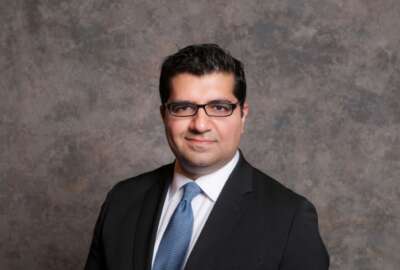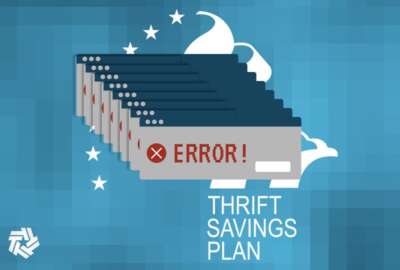Meet one of the government’s most experienced rule-making and evaluation experts
No agency proposes a big rule until it gets the okay from an office little known to the public. The Federal Drive with Tom Temin guest is the permanent deputy...
No agency proposes a big rule until it gets the okay from an office little known to the public. The Federal Drive with Tom Temin guest is the permanent deputy administrator of the Office of Information and Regulatory Affairs, Dominic Mancini, who also is a recent recipient of a 2024 Presidential Rank Award.
Interview Transcript:
Tom Temin Well, first of all, why do you think you got the presidential rank award? Because the White House didn’t say, and you have been there more than 20 years and you’ve seen a lot of big rules go by.
Dominic Mancini That’s correct. Well, first, you have to ask the folks who nominated me. But I will say, and I truly mean this, it really was the accomplishments of the team that I was just able to help facilitate. But there are, I think, were a few areas that they cited. One was the COVID pandemic, where we’ll get a little bit into how we normally do our job under the executive order for regulatory review. But one thing that we do normally is have 90 days to review something. And of course, during COVID, if we had 90 hours, that would have been too long. And so we kind of had to rip up the playbook and come up with something that facilitated inter-government coordination of a lot of rapidly moving things. That was one of the things that they cited our office’s ability to pivot and work much faster than we normally or comfortable working. And I think a couple of things that they also talked about in this administration, this administration on day one put together a very ambitious regulatory, what they called the modernization agenda. And that involved both updating and facilitating a lot of climate change policy and regulation. And our office played a key role in that, both a coordinating role and also offering some of the expertise in the economics of climate change. And also more generally, they committed, the president committed our office day one to do what we call regulatory modernization, which was looking at all of our policies and making sure that those policies are updating and to be more consistent with this administration’s priorities. And among those were doing a better job of figuring out who was impacted by regulation. We did a pretty good job looking at the net efficiency, looking at the cost benefits of regulation, but not necessarily who was impacted, who was hurt. And they were really wanted to place an emphasis on that in both our information function and our regulatory function. So those were the main things that they cited.
Tom Temin That’s a good time to ask about the basic function of OIRA. I think a lot of people in the federal government may not even know what it does, and you might want to explain it, especially when you talk about regulatory reform in the context of the ACUS, the administrative conference of the United States. They have a lot to say about rulemaking as a process. OIRA, I guess, is more concerned with the content of rules. So maybe sort that out for us.
Dominic Mancini Sure. So actually, the office, I’ll give a very brief bit of history, which was the office was actually created under the what’s called the Paperwork Reduction Act of 1980. But then at that time, President Reagan very quickly kind of also gave it an additional assignment to review draft and final regulations to make sure they were consistent with the principles the administration and that they basically have an evidentiary basis so the costs and benefits worked out. That’s basically what we’ve been doing ever since. The modern version of this is executive Order 12866, which were all required to memorize. That was issued by President Clinton. And it’s still the procedures under we work. And to give you a sense of like maybe the cultural history of OIRA. We actually recently just had an anniversary celebration of the 30th anniversary of the executive order, which is something that can only happen in D.C.
Tom Temin We’re going to say, yes, that’s something that’s really great talk at barbecues.
Dominic Mancini Absolutely. So what do we look at when a regulation comes in? So I’ll be very brief. We only look at a subset of regulations that we call significant. And if you think you go back to what Congress tells an agency to do, for instance, they tell an agency for fuel economy regulations, they will say go do good feel economy regulations. But how does an agency actually decide what level of that to do? And so our office really the agency is responsible for doing the analysis to justify any particular level of fuel economy that they would like in the structure of the regulation. So they can get a lot more complicated, everything from how to measure it, how to make sure different sizes of car might not have the same fuel economy standards, how to actually look at whether it be climate change benefits, fuel savings benefits, increase in the price of new cars versus cars. And so our office actually reviews these in a transactional basis to just make sure that the agency is doing a good job and offer advice. And as a derivative and as important function, we also set the standards themselves in order to the agency is have to look and this is through OMB policy, that we do a whole series of things that we just finished actually last month to update our actual analytical standards for how to look at the impacts of rules.
Tom Temin We’re speaking with Dominic Mancini. He’s the deputy administrator of the Office of Information and Regulatory Affairs, part of the White House and a presidential rank award recipient this year. That brings up an interesting question. You are a civil servant and you have been there at OIRA since 2002, I believe. So you’ve seen the yo-yo back and forth or the pendulum back and forth with Republican and Democratic administrations. They often have very different philosophical frameworks, very different approaches to how they want rules to be done. What’s that like and how do you deal with that? Because as a civil servant, you and your staff have to simply deal with the balls that are that are pitched to you.
Dominic Mancini That’s a good way of putting it. One of my duties actually is I’m kind of right in the middle of that, because I do act as the head of the office of the administrator during Presidential transitions. And I did act in that capacity and the last two transitions for very different administrations. Really, what I try to tell the staff is these are really at the end of the day, we do have the policies and words that we have that we take incredibly seriously. But one of those policies is to ensure that agencies are working towards presidential priorities. It really is a balance. Every administration, when they come in, they have a particular way, at least in my experience, everyone I’ve seen as a particular regulatory philosophy. Every administration freezes the regulations of the previous administration. So that is one of the things that we do. I think really, at the end of the day, it sometimes is a hard balance. Most administrations, I think all administrations that I’ve worked with have at the end of the day have said something like we know that we have a different philosophy, but we still want to make sure that what we do is based on evidence and policy. And ultimately regulations are also subject to courts. And the courts can also come in and decide whether an administration is actually adhering to the principles as established in each of the regulatory statutes that we set, and we look at.
Tom Temin Yes, because the power to regulate is in fact the power at least the potential to destroy. And you can reckon industry or you can effectuate change that is beyond what Congress envisioned without law or even what perhaps an administration thinks it was imagining. Do you ever come across where you might say, well, maybe this is not exactly what you want to do here?
Dominic Mancini That is one of the principles of the executive order to look at alternatives. And at the end of the day, the agency is responsible. And that’s in the words of the executive order. And our our policy is which alternative? And you should look at different alternatives. OIRA doesn’t it really take say a policy position to rule. But we will say, oh, this option might have a better evidentiary basis based on the principles that we’ve set than another option, and we might recommend that. And that happens sometimes.
Tom Temin And your bio, just to switch gears here for a minute, mentions that you were responsible for serving as the lead in the implementation of the Foundations for Evidence based policymaking act and the federal data strategy. How does that fit in with OIRA? And tell us what you did.
Dominic Mancini So first you have to look at the name. It is the Office of Information or Regulatory Affairs. So we actually do have, we’ve talked a lot about regulation so far, but that is one of kind of the two pillars of OIRA, and the other is information policy. This takes the form of under the Paperwork Reduction Act. We approve collections of information from the public and actually under the evidence Act, Foundations for Evidence Based Policy Act. There’s two parts of OIRA, the office of the chief statistician of the United States, which is actually in OIRA, and the privacy branch, which is actually also in OIRA. And they have explicit priorities and and implementation responsibilities under the Evidence Act. This is really things such as and we could go on for a long time, but for instance, the Evidence Act required the agencies to put together, which was a a single portal for if a researcher would like to access data from the public and we call it the SAP. Not even sure what that means. Those initials.
Tom Temin Yeah, there was a data.gov, I think that got established in the Obama administration, the repository, but that has evolved quite a great deal since.
Dominic Mancini And this is more of the data.gov. You think about it, that’s kind of the menu of that’s the kind of the resources that are already publicly available. But researchers sometimes want much more sensitive data, and that has to be subject to confidentiality restrictions and maybe even going in a federal controlled space in order for them to research, and that’s what I’m talking about. And that’s basically the information function of OIRA is actually. And it dovetails very well if you think about decision making, like it goes back to OIRA tries to help administrations make better decisions, and the information that goes into those decisions is often the make or break moment for when you’re going to make a good decision. So OIRA has both policies and implementation responsibilities that information production, and also the regulatory review.
Tom Temin And you seem pretty enthusiastic about work that is totally intellectual, a totally numbers based. In many ways. It sounds like the economics background is really what drives you.
Dominic Mancini It’s a little bit of everything. I think it can be extremely technically challenging if you think about understanding the literature for climate change, and that gets into all these large economy wide models.
Tom Temin Because they don’t all agree.
Dominic Mancini They don’t all agree. And there’s also how to synthesize those very different models. And if you looked at the latest EPA numbers, which I’ll say very emphatically, that EPA is the one responsible for the content of their reviews, but we do review those numbers. There’s a lot of different comparisons of models. It can also, a lot of times it’s not as intellectual, it’s not as much based on the numbers. It’s about who believes what and coalition building and negotiation. And I think if you are of a technical mindset and believe that’s the way you should make decisions, but also enjoy the cut and thrust of briefing up and decision making and that kind of thing, I think it’s a great place to be.
Tom Temin And just a devil’s advocate question, You might be seen again in some quarters and where you definitely don’t take sides on the show as an unelected bureaucrat with a lot of power over the economy. What’s your answer to that? If that comes up at that barbecue?
Dominic Mancini Yeah, first of all, I think no one has nearly as much power as anyone thinks. I think the what I do bring up is that one of, I said this already, that one of our principles is being kind of the eyes and ears of the administration. And we are effectively a career driven organizations, 90% career. We do have policy officials that we report to, and those ultimately are pretty close to the only elected official in the executive branch, which is the president and as vice president by derivation. So we should feel like we are exercising authorities that are very well grounded in the administration as as being an elected office.
Tom Temin And also the regulatory processes of the U.S. federal government have been described as the gold standard, in fact, around the world. In fact, I think a lot of government officials elsewhere have come to the United States to learn how our government goes about rulemaking. Is that part of your kind of background thinking when you’re going about your work.
Dominic Mancini That is actually. We do have a presence in some of the international organizations, such as the OECD and an APEC, and we work a lot with the Canadians, the Regulatory Cooperation Council. I would defer to the OECD on what they think does the best job, but they do emphasize things such as, as you said before, this is a large, lot of decisions are being made that have a large impact on people’s lives and having some accountability in those decisions. And those include public participation in those decisions. So notice and comment, that can take many different forms across the world. It includes providing an evidentiary basis for those decisions. That’s where analytical principles, and I think the U.S. does a pretty good job in all of those areas.
Copyright © 2025 Federal News Network. All rights reserved. This website is not intended for users located within the European Economic Area.
Tom Temin is host of the Federal Drive and has been providing insight on federal technology and management issues for more than 30 years.
Follow @tteminWFED






